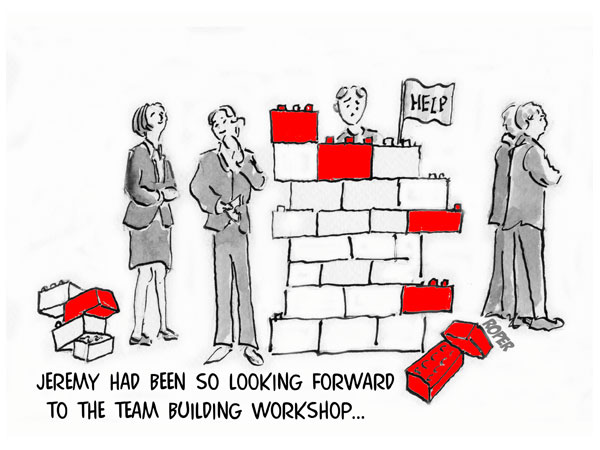
Here is why none of these will make your team more accountable or more collaborative, and what you need to do instead.
The last two years of the pandemic have upended the traditional model of ‘work’ for nearly all our clients. As the dust settles, and business leaders get to grips with fragmented teams and hybrid working, you know you need to create better collaboration and accountability – but how?
The problems you had with your team before the pandemic are probably the same as they are now:
- People not cooperating with each other, so information and problems fall through the cracks
- Team members not doing what they say they will do, so every meeting is exactly like the one before and you never get any further forward
- Job roles that aren’t clear, so they either overlap, causing people to tread on each other’s toes, or leave gaps so tasks don’t get done
- Gossip, blame, excuses and finger pointing within the team
- New people not integrated properly into the team.
For the last two years you’ve not even had that ‘sticking plaster’ of social interaction to make things a bit easier – a drink after work, pizzas on a Friday or bumping into someone in the corridor.
You know you have a problem with the team that feels a bit intangible, and you need to solve it. But how?
Here’s what you don’t do:
Activity-based ‘team building’ events: Outdoor activities – nothing like paint-balling or dangling someone off the end of a rope to improve communication in the office.
Classroom-based ‘team development training’: Games, role-plays, case studies and exercises used to encourage the team to analyse what’s going on.
Social activities: Away-days, group outings and meals together, in the hope that if people get to know each other better, the problems will miraculously evaporate by the time they get back to the office on Monday morning.
What’s wrong with any of that, you might ask. You’ve probably had to sit through your fair share of freezing cold outdoor team building, embarrassing role play, and stilted social events. What’s the problem with these? And what’s the alternative?
The solution
The alternative is to find a proper way to develop your team.
You need an activity for the team to work on together, or there is no reason for them to be a team. Run a mile from anyone who starts talking about exercises, case studies or games. How about activities you should all be working on together anyway – like developing your strategy, creating your business plan for next year, or clarifying your roles and how they intersect with each other?
Using real work tasks in this way, with skilled facilitation, team members learn how they communicate, operate in meetings, collaborate to get things done and make decisions – and all the time they are achieving useful results because they are working on real tasks.
You may worry that you and your team will find a pared-down process like this boring. In years of running such events, we have yet to find a group of people who don’t find it fascinating. People love talking about themselves and their issues, especially if the result is real changes in behaviour, and results which stick over the months and years following the event.
That’s what is really important at the end of the day. It’s not about getting to know each other better (though it’s great to do this), not being entertained (though we all like to have fun) and not a better level of understanding of team dynamics, interesting though this might be.
When the finger-pointing stops
What’s really important is results: real changes in behaviour, so people make promises they mean, and deliver on them. So the finger-pointing and complaining stops and people work together to invent lasting solutions that stick. Work begins to run smoothly and organically and be a source of pleasure and satisfaction in its own right.
Then, if you all want to, by all means go off for the weekend. Engage in whatever activity turns you on, and have a slap up meal at the end of the day – you’ll really have something to celebrate.
So, if you are interested in producing lasting results, talk to someone who knows how to address issues between people head on, in a series of natural, real conversations, with you and your whole team in the room. We’re happy to explore your issue with you and explain further – give us a call.
Contact me on 07770 221166, or email ab@leaderslab.co.uk to set up a conversation.


About The Author: Amanda Baines
Amanda has a passion for turning ‘average’ into ‘excellent’. She delivers outstanding results through her dynamic coaching, consultancy and facilitation, producing organisations which maximise everyone’s potential and in which everyone plays to their strengths.
More posts by Amanda Baines